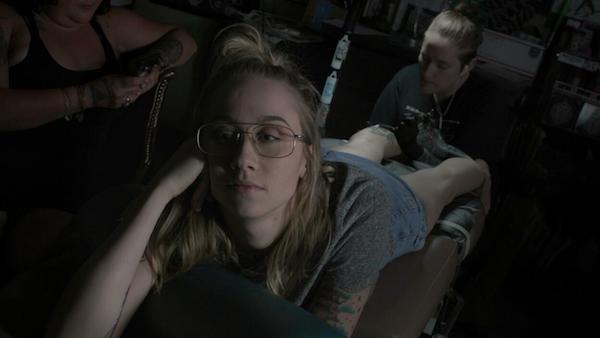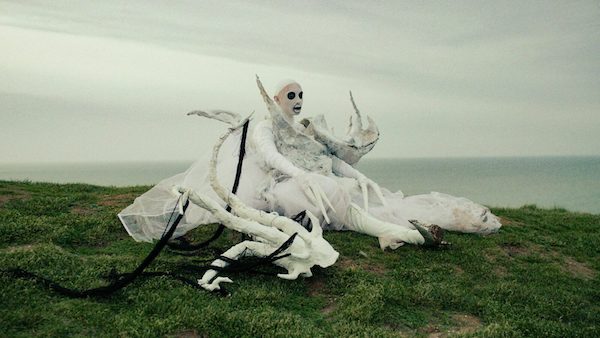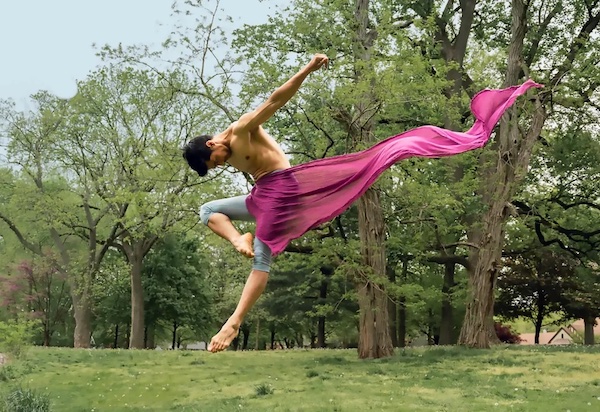Doc Talk: Outsider Insights at the Salem Film Fest
By Peter Keough
This year’s Salem Film Fest spotlights the price of being a rebel.
The outsider – in art, journalism, and politics – has often served as a stimulus to progress, a goad to complacency, and a spur to innovation. But as these documentaries at the Salem Film Fest (March 21-24) show, such nonconformity, however productive, can come at a cost.

Emily Nestor, host of the “Mile Marker 181” podcast, is the subject of Citizen Sleuth. Photo: Chris Kasick & Jared Washburn
Emily Nestor, the Gen Z title investigator in Chris Kasick’s dark, endearing, and twisted Citizen Sleuth (screens March 23 at 4 p.m. at the Cinema Salem with the filmmaker attending), had been inspired to become an amateur detective by her love for the FBI agent Clarice Starling in Jonathan Demme’s Silence of the Lambs. Like Jodie Foster’s character, Nestor was the product of a poor community in West Virginia but was determined, despite her origins, to make a difference in the world. In one touching moment in Citizen Sleuth Nestor plays back a scene in Demme’s movie in which Hannibal Lecter casts withering scorn on Starling.
“You know what you look like to me, with your good bag and your cheap shoes?” says Lector. “You look like a rube. A well-scrubbed, hustling rube with a little taste. Good nutrition’s given you some length of bone, but you’re not more than one generation from poor white trash, are you, Agent Starling? And that accent you’ve tried so desperately to shed: pure West Virginia.” Nestor sheds a tear. This is her life too.
If anything, Nestor’s situation might be more challenging than Starling’s. Lacking a college degree or any background in criminology or journalism beyond what she has seen in the movies, TV, and online, the way she could achieve her dreams of being a sleuth lay not in the rigorous training of Quantico. It was via the rough and tumble, controversial world of true crime podcasting. Her program is called “Mile Marker 181” – named after the highway post where young local woman Jaleayah Davis’s car came to rest after the driver met with a bizarre and gruesome death.
The police determined it was an accident, but her family denies it, as does Nestor. She has perused the thousands of pages on the case made available by the Freedom of Information Act, has driven the fatal route with a stopwatch in an attempted reenactment, interviewed witnesses and experts, and believes that people with connections in high places have done the deed. And she has won an audience of dedicated listeners, a growing fan base that has brought her to the attention of another one of her idols, Nancy Grace. Her ambition is rewarded, but is it at the expense of the truth?
Kasick has worked with Errol Morris on films and TV shows and, at times, Citizen Sleuth evokes the former’s The Thin Blue Line (1988). Bu,t as Nestor’s case starts to look shaky, and for income she needs to resort to ads for serial killer tee shirts on her podcast, his increasingly troubled questions from off screen sound more like Morris’s interviews via his Interretron. Is Nestor an outsider defying a corrupt system or just another hack profiting from it?

A scene featuring Gena Marvin in Queendom.
The stakes are higher for 21-year-old Gena Marvin (born Gennadiy Chebotarev, she/her, non-binary) in Agniia Galdanova’s restrained but shocking Queendom (screens March 23 at 3:45 p.m. at the Peabody Essex Museum). The documentary’s limpid account of Marvin’s story unfolds with unexpected twists and moments of surreal glory.
Gena is a queer artist in Magadan, a bleak, snow-swept Siberian town that had served as the gateway to the gulags in Stalinist times. Not a welcoming place for someone who shops at the grocery store dressed in a white bustier, a lacy ruff, black platform boots, and little else. Her head is shaven, painted white, with eyes and mouth outlined in black. She looks like a cross between Pulcinella and Nosferatu. Security guards confront her, tell her that her underwear is showing, and ask her to leave. Back home, old women yell insults and threats at her from their windows in the apartment building next door. She responds with cutting put downs.
Her grandparents, with whom Gena lives, begrudgingly accept her but constantly ask how she is going to make a living. She tries to explain that she is building a brand and a following on TikTok but they are skeptical. Nonetheless, they send her off to Moscow, where she studies at a cosmetics school, and the city, though more cosmopolitan, is perhaps more dangerous. Here Gena and her coterie of fellow outsiders are more likely to be noticed by gawkers and taunters taking pictures on their cell phones when they promenade in their otherworldly, transgressive outfits. Here they are more likely to be assaulted, arrested, or killed.
Not that Gena is shy about challenging the homophobic, fascist, patriarchal status quo. She visits a park where paratroopers are holding a rally. Noting her outfit – a Versailles-looking garb by way of Kenneth Anger with a towering pastry-like headdress, a bodice of tubes, white platforms, sheer stockings, and a bare ass – a guard advises her, for her own safety. not to enter. Reluctantly, she leaves, haughtily ignoring the drunken paratroopers leering at her on the subway.
On another occasion Gena participates in a demonstration protesting the arrest of Alexander Navalny. Dressed in a duct-tape version of the Russian flag, she is arrested. Her school expels her. Desperate, she returns to Magadan, where Gena helps her grandfather gut fish and numbly listens to his tirades against her lifestyle and his advice that she join the army. Later, back in Moscow, Gena’s fortunes seem to rise when she stars in a fashion show. But then Putin invades Ukraine and Gena puts on an outfit made of barbed wire like a crown of thorns. She marches, resigned and undaunted, to join the brave few in a shattered demonstration against the war. (Another Arts Fuse review of Queendom)

A scene from Call Me Dancer. Photo: Shampaine Pictures
Leslie Shampaine and Pip Gilmour’s Call Me Dancer (screens March 24th at 5:15 p.m. at the Cinema Salem with the filmmakers attending) tells a more upbeat story about another outsider who has a calling and perseveres in fulfilling it. Their film is as irresistibly sweet-natured as its subject, Manish Chauhan, the son of a taxi driver in Mumbai who was drawn to dancing after watching a Bollywood musical and being amazed by a backflip executed by one of the performers. He duplicated the stunt, and in doing so fell in love with dance. His parents, though, wanted him to get an education and enter a profession where he would make a good living and support them in their old age. He obliged them by attending college, but the passion didn’t die and he surreptitiously took classes at a ballet school where he met his mentor, Yehuda Ma’or.
Ma’or is himself an outsider of sorts. Now in his 70s, he had been a ballet dancer in his youth and a member of a number of prestigious companies but had never made the big time because of his towering height. He went into teaching and, uncompromising about his art, was not always easy to work with. After losing a job in Israel he ended up in India where traditional ballet did not have much of a presence. In Manish he saw the raw talent, athleticism, and dogged dedication of a future star. But Manish had gotten off to a late start in his classical training — finding a well paying position at this late stage would prove to be a challenge.
In an uncanny meta-twist, a Bollywood studio learns about Manesh and invites him to make a movie about his life. It proves to be a success, but in the course of shooting it Manish aggravates an injury that requires surgery and a long convalescence. Will it end his dancing career? Let’s just say that the true story would challenge any Bollywood fiction.
Full disclosure: I’ll be serving as a juror in the Salem Film Fest.
Peter Keough writes about film and other topics and has contributed to numerous publications. He had been the film editor of the Boston Phoenix from 1989 to its demise in 2013 and has edited three books on film, most recently For Kids of All Ages: The National Society of Film Critics on Children’s Movies (Rowman & Littlefield, 2019).
Tagged: "Call Me Dancer", Agniia Galdanova, Chris Kasick, Citizen Sleuth, Emily Nestor, Gena Marvin, Leslie Shampaine, Pip Gilmour, Queendom
